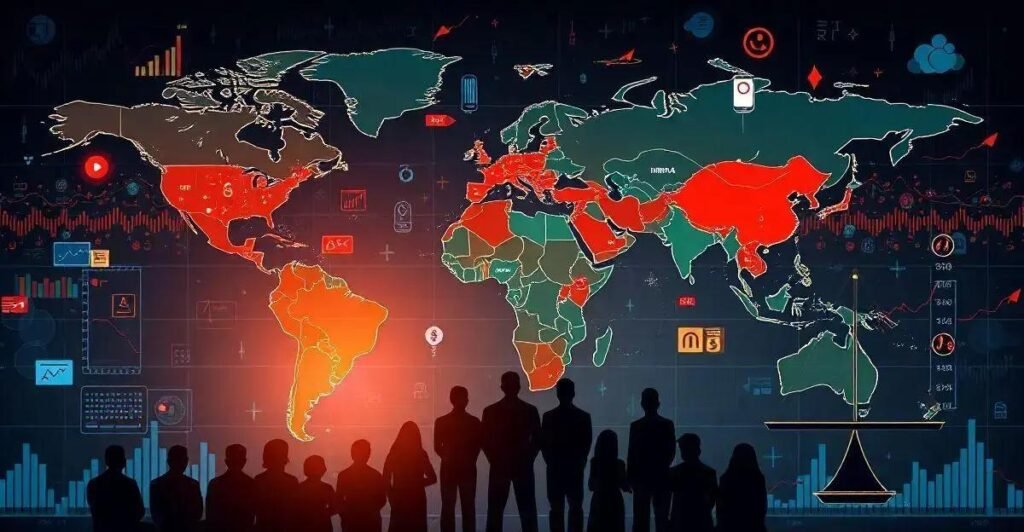The world economy is constantly evolving, with new trends and insights emerging every day.
In this article, we’ll delve into the latest global economy trends and explore what’s driving the changes.
With the rise of globalization, technological advancements, and shifting economic powers, it’s essential to stay informed about the global economy trends to make informed decisions.
In this piece, we’ll examine the key factors shaping the global economy and what they mean for businesses, investors, and individuals.
Defining the Global Economy
The global economy is a complex system that encompasses the countries’ economic activities, trade, and financial flows.
It is influenced by various factors, including government policies, technological advancements, and global events — factors that shape the global economic outlook as reported by the International Monetary Fund (IMF).
The global economy is often divided into three main segments: the developed economies, such as the United States and Europe, the emerging markets, like China and India, and the developing countries.
Understanding the global economy is crucial for businesses, investors, and individuals to make informed decisions about investments, trade, and economic growth.
The Impact of Globalization

Globalization has had a profound impact on the global economy, leading to increased trade, investment, and cultural exchange.
As a result, businesses and individuals have access to new markets, resources, and ideas.
However, globalization has also created challenges, such as income inequality, job displacement, and cultural homogenization.
Furthermore, the rise of emerging markets has led to a shift in the global economic power dynamics, with countries like China and India playing a more significant role in the global economy.
To succeed in this new economic landscape, businesses must be adaptable, innovative, and able to navigate the complexities of globalization.
Economic Indicators to Watch
Economic indicators are crucial for businesses and investors to stay informed about the global economy.
Some key indicators to watch include GDP growth rates, inflation rates, unemployment rates, and exchange rates.
Additionally, monitoring consumer spending, industrial production, and trade balances can provide valuable insights into the economy’s performance.
Furthermore, keeping track of interest rates, credit ratings, and commodity prices can help businesses make informed decisions about investments and risk management.
By staying up-to-date with these economic indicators, businesses can anticipate changes in the global economy and adjust their strategies accordingly.
The Role of Technology

Technology has revolutionized the global economy, transforming the way businesses operate and interact with customers.
The rise of digital platforms, social media, and cloud computing has enabled companies to reach a global audience, streamline operations, and access new markets.
Furthermore, technologies such as artificial intelligence, blockchain, and the Internet of Things (IoT) are changing the way businesses innovate, collaborate, and make decisions.
As technology continues to evolve, it is essential for businesses to stay ahead of the curve, invest in digital transformation, and leverage technology to drive growth and competitiveness.
Challenges and Opportunities
The global economy is not without its challenges, including trade tensions, currency fluctuations, and economic uncertainty. However, these challenges also present opportunities for businesses to adapt, innovate, and thrive.
For example, the rise of e-commerce has created new opportunities for small businesses to reach a global audience, while the increasing demand for sustainable products has driven innovation in the manufacturing sector.
Furthermore, the global economy’s shift towards digitalization has created new job opportunities in fields such as data science, cybersecurity, and digital marketing. By embracing these challenges and opportunities, businesses can stay ahead of the curve and drive growth in the global economy.
The Future of Global Economy

The future of the global economy is uncertain, but one thing is clear: it will be shaped by technological advancements, shifting global dynamics, and changing consumer behaviors.
As the world becomes increasingly interconnected, businesses must adapt to these changes to remain competitive. The future of the global economy will be characterized by increased digitalization, sustainable practices, and a focus on innovation and entrepreneurship.
It is essential for businesses to stay ahead of the curve, invest in digital transformation, and develop strategies to drive growth in this new era.
Frequently Asked Questions about Artificial Intelligence in Small Business
How can automating tasks benefit my small business?
Automating tasks frees up your team from repetitive activities, increasing productivity and allowing them to focus on more strategic tasks.
What tools can I use for data analysis?
There are various tools available, such as Google Analytics, Tableau, and Microsoft Power BI, that help collect and interpret valuable data.
What are chatbots and how do they improve customer service?
Chatbots are virtual assistants that can answer questions and solve problems at any time, improving customer experience and freeing up your team.
How can I personalize the customer experience?
Through data analysis, you can better understand customer preferences and offer personalized recommendations and promotions.
Why is customer feedback important?
Feedback is essential to identify areas that need improvement and adjust your service strategy, ensuring customer satisfaction.
Is artificial intelligence accessible to small businesses?
Yes, there are many AI solutions that are accessible and scalable for small businesses to implement and improve efficiency and customer service.
